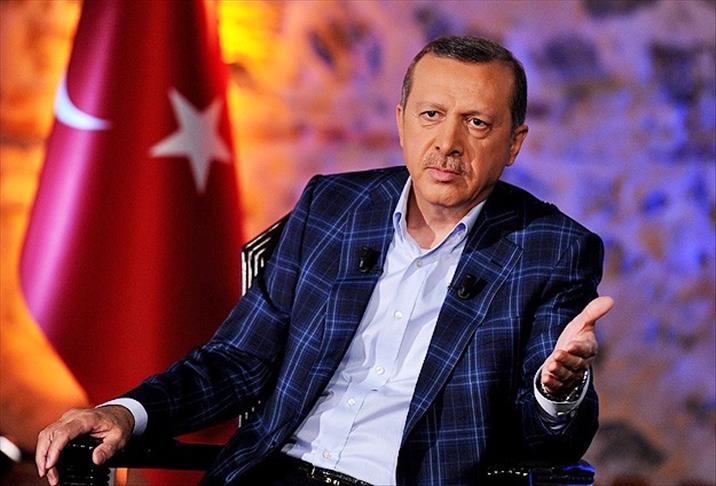
ANKARA
Turkey's Prime Minister Recep Tayyip Erdogan indicated he may seek the extradition of Fethullah Gulen, the U.S.-based cleric who leads a movement that the Turkish government describes as a 'parallel state' to target Erdogan and his government.
During a televised program on Thursday, Erdogan, upon questioning about a phone call with U.S. President Barack Obama on Gulen a fortnight ago, said he called Gulen "the source of unrest in my country" and urged Obama to act in the interests of any nation who is under threat.
"Obama said he understood the message," Erdogan said.
Erdogan also responded with declaring that the issuing of a red notice for Gulen - similar to an international arrest warrant, was a possibility. "Why not?" he said, "But first you have to lay the groundwork,"
The issuing of an international red notice requires Turkey's judiciary to establish that Gulen's actions were criminal.
- Tens of thousands "wiretapped"
Turkey's government says the 'parallel state' wanted to deal a political blow to Erdogan before the local elections on March 30 under the pretense of the anti-graft operation which began on December 17.
Since then, Turkey has witnessed a flurry of wiretapping leaks online, which were related to both the government and Gulen's movement.
Both Erdogan and Gulen have dismissed some of the recordings as doctored, stressing the illegal nature of part of the wiretapping activity that was revealed through the leaks.
Prime Minister Erdogan said tens of thousands of people have been wiretapped as part of an illegal practice which he said began in 1980s but reached its peak in recent years.
Several Turkish dailies published documents late last month which showed that prosecutors - allegedly linked to the 'parallel state' - ordered eavesdropping that targeted over 7,000 people in politics, business, civil society, media and academia over a period of three years.
During the program, Erdogan was asked how he would confront the parallel state's activities and plots and if he would impose sanctions. His response was that the judiciary was "designed" to provide impunity to members of the 'parallel state'.
"That's why we began with the HSYK," Erdogan said, referring to a recent judicial reform that changed the organizational structure of Turkey's top judicial body, the Supreme Board of Judges and Prosecutors (HSYK).
Erdogan added his government would seek to do more to fight the 'parallel state' following the local elections. He hinted at the possibility of taking measures on social media and video-sharing websites, where phone-hacking leaks are disseminated.
A recent law that gives a state body tighter control over access to online content has faced criticism in Turkey and internationally. The government says the law will make the internet safer to use.
- Civil war in Syria
Having discussed the use of conventional and chemical weapons in Syria at the G20 summit and at the Sochi Olympics, Prime Minister Erdogan said there should not be any discrimination between the killing by chemical weapons or through conventional weapons as both should be considered humanitarian crimes.
"When 120 thousand people were reported dead because of conventional weapons and 1,500 others with chemical weapons, I said 'Will you count the chemical weapon deaths as victims, but not those killed by conventional weapons victims? Is that how it's going to be?' There are people dying there and it is a crime against humanity."
Erdogan also spoke on the war in Syria during the Sochi Olympics with Putin as well. He said that he questioned Putin on his stance on Syria. "You are still not taking up a position against Assad's regime. If you are making plans about the Mediterranean Sea, Turkey has a long coast to the sea as well, we can talk about it. But there are people dying there and we need to stop it first" he said in relation to Russia's historical ambitions for further control in the Mediterranean coast.
- Referendum decision in Crimea
On questioning of Turkey's position if Crimea decides to join Russia, Erdogan replied that the Ukrainian central government need to be consulted. "A total of 650 thousand Tatarian and Ukrainian people live in Crimea and this is not a number to underrate". He also reiterated that Turkey's will is for Crimea to continue to be a part of Ukraine.
Erdogan responded to the question on whether Kosovo set an example for the crisis in Crimea, by emphasizing that the Serbs are a minority in Kosovo and he said the situation in Crimea is different.
"The Serbian people constitute only five percent of the total population in Kosovo. Even under these circumstances, some people are trying to impose sanctions on Kosovo," he added.
Turkey's Prime Minister also said the incidents in Ukraine are similar to Gezi Park and cautioned that Turkey has always supported Crimean Tatars in the country.
englishnews@aa.com.tr
Anadolu Agency website contains only a portion of the news stories offered to subscribers in the AA News Broadcasting System (HAS), and in summarized form. Please contact us for subscription options.

